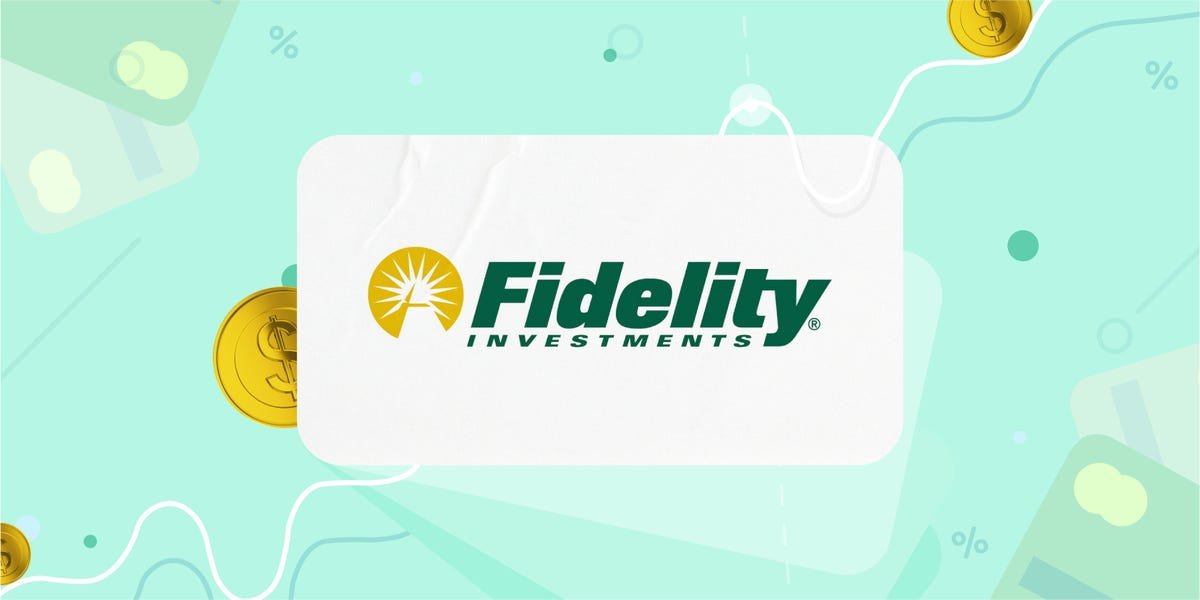Paid non-client promotion: Affiliate links for the products on this page are from partners that compensate us (see our advertiser disclosure with our list of partners for more details). However, our opinions are our own. See how we rate investing products to write unbiased product reviews.
Fidelity is one of the largest — and best — brokerage and robo-advisor platforms, offering a robust selection of trading tools, brokerage accounts, and advanced trading features. Fidelity investment account features include commission-free trades, automated trading, retirement planning calculators. Fidelity also stands out for its youth brokerage account options.
About Fidelity
Fidelity Investments is one of the best online brokerages for comprehensive robo-advice, mobile investing, and personalized wealth management services. All types of investors, including teenagers and beginners, can benefit from commission-free trading with Fidelity Investments.
Fidelity has you covered whether you prefer a passive or active investing strategy. You can trade stock, ETFs, options, and fee-free mutual funds in a self-directed brokerage account or automated trading account. Or, you can invest in the Fidelity Basket Portfolio and create custom mutual funds of hand-picked securities.
In addition to its online platform and mobile apps, Fidelity offers a trading platform specifically for its active traders: Active Trader Pro. Fidelity Active Trader Pro features include real-time trading alerts, investing insights, portfolio monitoring, customizable dashboard layouts, and options trading assistance — though it doesn’t have a mobile option.
Is Fidelity Right For You?
Fidelity Investing is one of the best online brokerages for beginners, offering a wide range of accounts for all kinds of investors. Fidelity offers active and passive account options, plus a large selection of robust charting tools and advanced metrics. Both hands-off and hands-on investors can benefit from a Fidelity online brokerage account.
That said, passive investors with high account balances may want to consider a different robo-advisor to avoid Fidelity’s 0.35% annual fee.
Fidelity Pros and Cons
Fidelity Pros
- Low account minimum and fees
- Commission-free stocks, ETFs, options, and fractional shares
- Large range of investing tools and trading platforms
- Fee-free mutual funds
- Fidelity basket and youth basket portfolios
Fidelity Cons
- Robo-advisor requires a higher minimum to access unlimited CFP access
- Robo-advisor doesn’t invest in ETFs
- Newer investors may be overwhelmed by the number of options
- No tax-loss harvesting options
Is Fidelity Trustworthy?
The Better Business Bureau has given Fidelity Investments an A+ rating. The BBB assigns its ratings by using a grade scale of A+ to F.
The bureau considers several factors when determining its ratings. These include the company’s time in business, responses to customer complaints, business operations, licensing and government actions, advertising issues, and more.
Following a cyber-security attack in late November 2023, Fidelity is faced with a class action lawsuit by loan care servicer Teneika Tillis based on allegations of inadequate security measures and negligence with customer data. This case is still pending.
Ways to Invest With Fidelity
Cash Management Accounts
Fidelity states that the purpose of a Fidelity Cash Management Account is to complement (not replace) an already existing brokerage account. The Cash Manager tool automatically moves funds between your Fidelity accounts to match your investment goals better.
It pays 2.72% APY on your cash account balance with funds accruing daily interest, paid monthly on the last business day of every month. There are no account fees or minimums.
Self-directed Brokerage Accounts
Fidelity’s self-directed brokerage account serves active traders wanting complete control of their investments. With this account’s flexibility, investors can invest in various assets, including stocks, bonds, mutual funds, and ETFs. It offers commission-free trades, fractional shares, and smart trading technology.
This may appeal to advanced traders looking to hand-pick investments and accomplish goals on their own time.
Fidelity Go
Fidelity Go is the brokerage’s fully automated account offering comprehensive robo-advice and portfolio management for a custom blend of domestic and foreign stocks, bonds, and other short-term investments. It doesn’t offer ETFs and isn’t a good choice for investors wanting to capitalize on short-term stock market trends.
For $10 to start investing, you can open a Fidelity Go account as a regular brokerage, retirement, or health savings account. Fidelity Go now provides unlimited access to a certified financial planner (CFP) with an account balance of $25,000 or more. You can unlock one-on-one personalized advice and guidance for no additional charge.
Fidelity uses a combination of Fidelity Flex mutual funds in its Fidelity Go portfolios. These funds contain a mix of domestic stocks, foreign stocks, bonds, and other short-term investments, according to Fidelity.
A team of investment professionals handles Fidelity Go’s day-to-day trading decisions. An existing Fidelity brokerage account can be converted to a Fidelity Go account. However, it doesn’t offer ETFs or tax-loss harvesting.
Managed Accounts
Outside of Fidelity Go, there are two different managed accounts: Fidelity Wealth Services and Fidelity Strategic Disciplines. Both account options give investors access to human advisors.
- Fidelity Managed FidFolios: These portfolios of personalized stocks are professionally managed by a team of Fidelity experts using a tax-smart investment strategy.
- Fidelity Wealth Services: If you’re not interested in investing through a robo-advisor, Fidelity Wealth Services grants you immediate access to a financial advisor who solely provides personalized investment management. There’s no automated management involved. You can also invest in a BlackRock Diversified Income Portfolio or tax-sensitive program account, but you must meet the $200,000 minimum requirement.
Retirement Savings Accounts
Fidelity offers several retirement accounts, including:
With a retirement account, you can access several retirement calculators and tools, including the guaranteed income estimator, IRA contribution calculator, retirement strategies tax estimator, savings planner, and the Fidelity retirement score.
Fidelity Youth Account
Fidelity was one of the first brokerages to offer a DIY investing account for minors (aka a teen brokerage account). It’s free to set up and designed for children aged 13 to 17 with a parent or guardian with an existing Fidelity account.
You can invest in a limited selection of U.S. stocks, ETFs, fractional shares, and Fidelity mutual funds. Moreover, Fidelity now offers Youth Baskets for no extra charge. Parents can monitor account activity with the Fidelity mobile app. Investments in cryptocurrencies, penny stocks, international stocks, foreign currencies, and IPOs are currently prohibited.
Once you turn 18, you must transition the account to Fidelity’s standard brokerage account. According to Fidelity, the debit card issued will still be valid until it expires, at which point it will issue a new debit card.
Custodial Accounts
If you’re a parent or guardian with a child/dependent under 18, you might be interested in Fidelity’s selection of savings and investment accounts for minors to learn how to manage money responsibly.
- Fidelity custodial account (UGMA/UTMA): With the best custodial accounts, parents and guardians can invest money in various assets on behalf of a child or dependent.
- Roth IRA for Kids: This account operates much like a regular Roth IRA account with the same tax advantages and annual max contributions (up to $7,000 per child in 2024). Funds are managed by a parent/guardian but must be transferred to the child at ages 18 to 25 (varies by state). This account offers stocks, bonds, options, mutual funds, fractional shares, and CDs.
- Fidelity’s 529 plans: Save toward future education expenses with Fidelity’s 529 accounts for tax-free withdrawals, no account minimums, and no account fees. Fidelity’s Age-Based Strategies rely on portfolios with asset allocations tailored toward your beneficiary’s current age. With Age-Based Strategies, you’ll choose the following three investment strategies: Fidelity Funds, Fidelity Blend Funds, and Fidelity Index Funds.
Disability Savings Accounts
Fidelity Attainable Savings Plan is an ABLE account for investors already receiving Social Security Disability Insurance (SSDI) and/or Supplemental Security Income (SSI), including children and dependents. It grows tax-deferred funds and can become federal income tax-free if used for eligible disability expenses.
The point of the account is to provide an accessible way for disabled individuals to save for qualified disability expenses. Qualified expenses include education, housing, employment, transportation, personal support services, training and support, assistive technologies (and related services), and basic health and living expenses.
Cryptocurrency Accounts
A Fidelity Crypto account offers commission-free trades to buy and sell bitcoin and ether. Although the cryptocurrency selection is limited, it may suit beginners or causal crypto investors. Plus, pairing with existing Fidelity Digital Assets accounts is easy.
Fidelity is also offering bitcoin ETFs after the SEC’s approval in 2024. The fund is called the Fidelity Wise Origin Bitcoin Fund (FBTC), and it aims to track the performance of bitcoin on the traditional market. Fidelity Crypto is only available in the U.S.
Check out Business Insider’s guide to the best cryptocurrency exchanges »
Investment Options
Between all of the different accounts, the investment options available for Fidelity include stocks, bonds, options, mutual funds, ETFs, REITs, fractional shares, crypto, money market funds, IPOs, deferred fixed annuities, precious metals (gold, silver, platinum, and palladium), CDs, and other fixed-income products.
Active traders can place commission-free trades on stocks, ETFs, and options trades. Fidelity offers more than 3,700 no-transaction mutual funds. Regarding mutual funds, you can also invest in Fidelity’s ZERO expense ratio index funds. These funds contain a $0 account minimum and 0% expense ratio.
Fidelity offers fractional share investing for US stocks and ETFs. You can also choose to invest in sustainable investing through Fidelity’s environmental, social, and governance with ESG investing options. Also, if you want to diversify your portfolio globally, Fidelity offers international stock trading in more than 25 countries and 16 currencies.
Fidelity Fees
Fidelity has a huge selection of account types. Therefore, fees, minimums, and rates can greatly vary. Most Fidelity accounts — like Fidelity Go, custodial and Youth accounts, and IRA accounts — cost $0 to open and don’t require account minimums.
But that’s not true for all Fidelity accounts. Some accounts have quite a high account minimum. For example, Fidelity Wealth Services charges an annual account fee ranging from 0.50% to 1.50% and a $500,000 account minimum.
Fidelity Go accounts have no account minimums, require at least $10 to start investing, and generally have low fees. But you’ll pay slightly more for higher account balances. Fidelity Go accounts with balances under $25,000 don’t charge an annual advisory fee. Accounts with $25,000 or more balances charge an annual 0.35% advisory fee.
There are no minimums to invest in Fidelity mutual funds, plus no transaction fees. Fidelity charges $0 per stock and ETF trade and $0.65 per options trade. Secondary trading of bonds or CDs costs $1 per bond. Online traded US Treasuries are free.
One of the biggest assets of investing through a Fidelity account is its 0% expense ratio when you invest in Fidelity ZERO index funds. But you may still pay a low expense ratio, depending on your investment portfolio.
Fidelity Alternatives
Fidelity vs. Charles Schwab
Charles Schwab automated investing is an investing and wealth management powerhouse catering to individuals and institutional investors. Charles Schwab acquired TD Ameritrade in 2019. Like Fidelity, Charles Schwab offers many brokerage account options, including automated accounts and professionally managed portfolios.
Self-directed accounts require no minimum investment and no fees with either platform. Moreover, both Fidelity and Charles Schwab offer thousands of no-transaction-fee mutual funds. However, Charles Schwab doesn’t offer crypto-trading options, whereas, with Fidelity, you can trade cryptocurrencies and stocks in a Fidelity Crypto account starting at $1.
Fidelity also has a one-of-a-kind Fidelity Youth account: A teen-owned brokerage account offering beginner-friendly trades and learning tools. Schwab does offer custodial account options, such as a custodial IRA and 529 plans, but not a teen brokerage account.
Schwab is best for folks interested in a Personal Choice Retirement Account for investing in a wider range of securities or a Trust and Estate Accounts. Socially responsible investors may also prefer Schwab over Fidelity since Schwab offers a donor-advised fund account that allows you to structure charitable contributions with tax advantages.
Fidelity vs. Vanguard
Vanguard is another large online brokerage offering competitive financial planning and investment services with low fees and a robust robo-advisor. Like Fidelity, Vanguard brokerage services include self-directed, automated, retirement, and education savings account options. However, Fidelity has a much larger selection of account options.
If you want to invest in Vanguard’s renowned ETFs and funds, you can open a Vanguard brokerage account for no minimum and no annual account fee. Vanguard is the stronger platform for financial professionals, retirement-focused individuals, and goal-based investing. Pre-retirees can invest in Vanguard’s All-In-One retirement funds in their IRA or 401(k). But there’s a $1,000 minimum.
Vanguard does not offer cryptocurrencies, so crypto investors are better off with Fidelity. In Addition, Fidelity’s robo-advisor (Fidelity Go) is better for people with balances below $25,000 and is the overall cheaper option.
Fidelity Go vs. Betterment
Fidelity Go and Betterment Investing are platforms specializing in automated investment advice and offering portfolio rebalancing features. Both robo-advisors have no account minimums and $10 investing minimums. They mainly differ in fees and investment choices.
Fidelity Go is better for people looking to invest in a portfolio of mutual funds with its unique Fidelity ZERO index funds, Fidelity Basket Portfolios, and no-fee mutual funds.
On the other hand, Betterment’s robo-advisor is best suited for those looking to invest in ETFs. Additionally, Betterment is great for tax-optimizing strategies that Fidelity currently lacks.
Why You Should Trust Us: How We Reviewed Fidelity
We examined Fidelity using Business Insider’s rating methodology for investing platforms to compare pricing, account flexibility, ethics, security, and overall customer experience when reviewing investing platforms. Platforms are given a rating between 0 and 5.
Investing platforms offer multiple assets, trading tools, fees, and other resources. Some investing platforms are better for more advanced or active investors, while others may better suit beginner and passive investors. Fidelity was evaluated with a focus on how it performed in each category.
Business Insider’s Overall Fidelity Rating
Fidelity — Frequently Asked Questions (FAQs)
Fidelity Investments is one of the largest financial service corporations, offering competitive pricing for its various banking and brokerage services, including wealth management, life insurance, retirement planning, education savings, and disability. You can trade a wide range of investible securities through the platform’s robo-advisor or advanced trading platforms like Active Trader Pro.
Fidelity Investments supports beginner investors with its user-friendly trading platform, beginner-friendly investment strategies, and commission-free trades. For no minimum, you can open a Fidelity Go brokerage account for comprehensive robo-advice and access to tools like personalized portfolios and retirement planning calculators. There are also educational resources for investors by Fidelity specifically designed for beginners.
Advanced traders can use Fidelity’s Active Trader Pro platform to access customizable charting features, real-time analytics, complex options strategies, and premium market data. Fidelity’s advanced trading is best for sophisticated traders who want access to more complex strategies and tools. You can even subscribe to Fidelity Basket Portfolios to create a hand-picked mutual fund.
Fidelity Investment offers a transparent fee structure that rivals its competitors. The online brokerage has no account minimum and no fees for its regular brokerage services and its robo-advisor. In addition, there are commission-free trades for U.S. stocks, ETFs, and options. However, there is still a $0.65 per contract fee for options. Managed accounts require much higher minimums and fees in exchange for comprehensive financial management services and advanced features.
Fidelity Investments rates highly for customer service, with various support features to help clients navigate their financial journey. Fidelity offers support through live chats, phone calls, in-person consultations, and CFP guidance.








